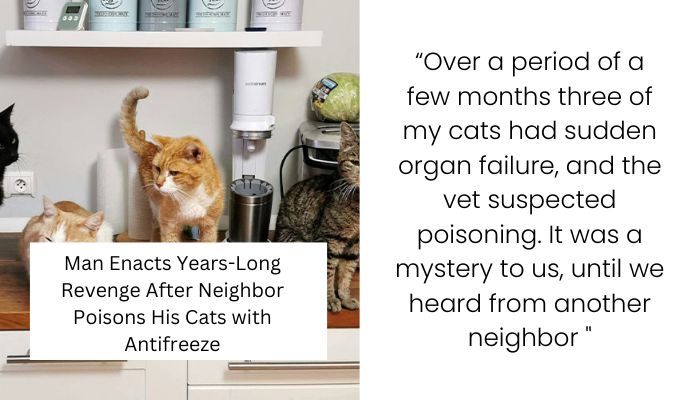Man Enacts Years-Long Revenge After Neighbor Poisons His Cats with Antifreeze
In a poignant narrative set in the 1980s, the author recounts a distressing conflict with a neighbor notorious for her disdain toward animals. This neighbor’s animosity culminated in the deliberate poisoning of the author’s cats using antifreeze, leading to tragic fatalities. Upon discovering the neighbor’s culpability, the author devised a non-violent form of retribution by scattering bird seed and walnuts across her yard, attracting a multitude of wildlife to the chagrin of the animal-averse neighbor. This act served as both a personal catharsis and a subtle admonition against her cruel actions.
After this man’s cats suddenly became ill, his neighbor was heard bragging about how she was behind it

So he decided it was time to get revenge on the animal hater
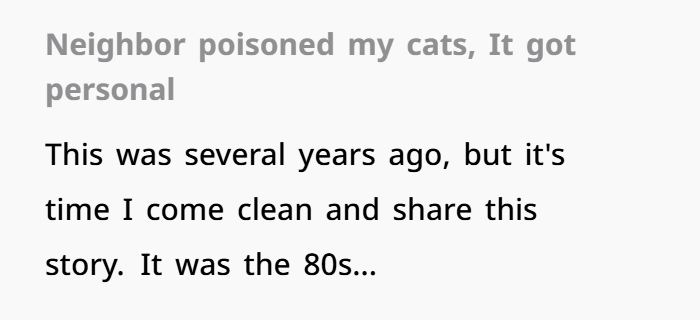
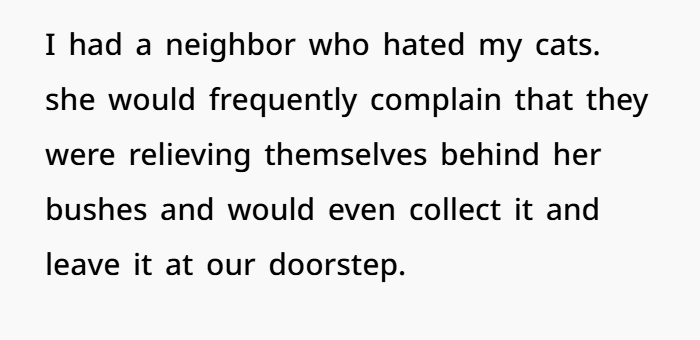
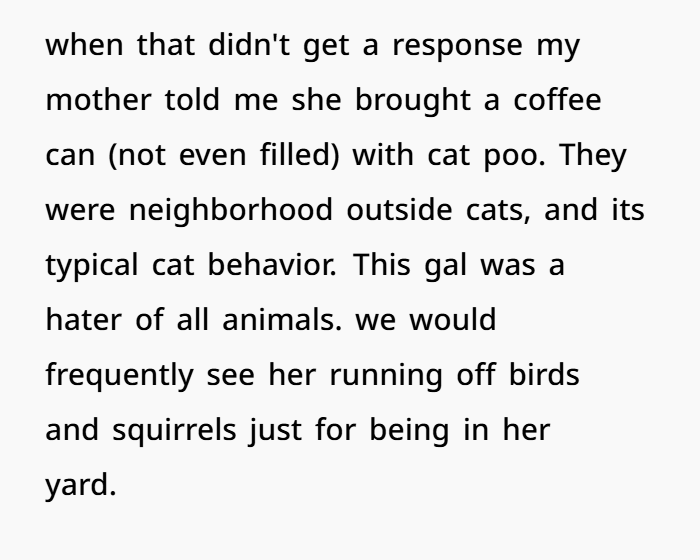
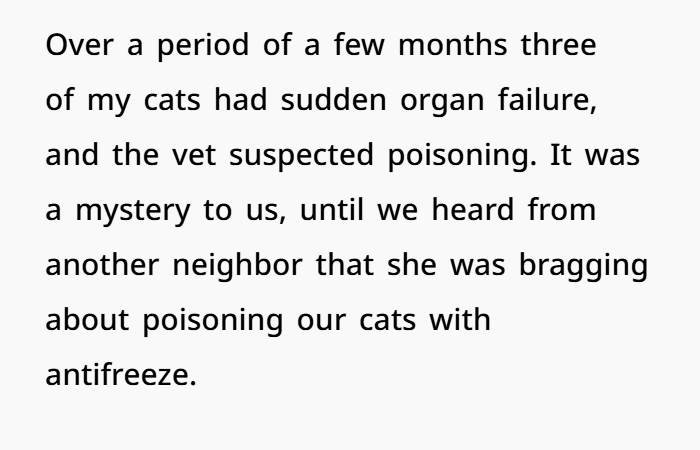
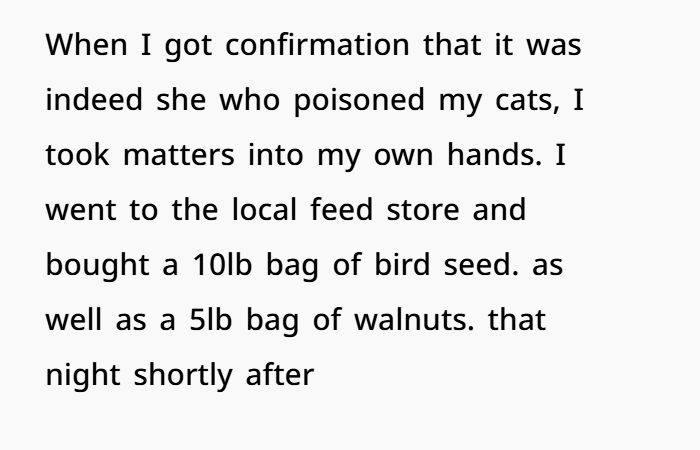



The account you’ve shared is a poignant narrative that underscores the profound impact of neighborly conflicts, especially when they involve beloved pets. The deliberate poisoning of your cats by your neighbor not only led to the tragic loss of your companions but also ignited a series of retaliatory actions that highlight the complexities of human emotions and relationships. This situation brings to light several critical issues, including the dangers of antifreeze poisoning in cats, the ethical and legal ramifications of animal cruelty, and the psychological dynamics of revenge.

Antifreeze Poisoning in Cats: A Silent Killer
Antifreeze, commonly containing ethylene glycol, poses a significant threat to cats due to its sweet taste and high toxicity. Even minimal ingestion can be lethal. Cats are particularly vulnerable, with as little as 1 to 2 teaspoons (5–10 ml) being potentially fatal for an average-sized feline. The toxicity progresses rapidly through three stages:
- Stage 1 (30 minutes to 12 hours post-ingestion): Symptoms resemble alcohol intoxication, including unsteady movements, drooling, and vomiting.
- Stage 2 (12 to 24 hours post-ingestion): Apparent improvement may occur, but internal damage continues, leading to increased heart rate and dehydration.
- Stage 3 (24 to 72 hours post-ingestion): Severe kidney failure develops, manifesting as lethargy, vomiting, seizures, and potentially coma.
Immediate veterinary intervention is crucial. The antidote, fomepizole, is most effective when administered within three hours of ingestion. Delayed treatment often results in a grim prognosis. Preventative measures include storing antifreeze securely, cleaning spills promptly, and considering the use of products containing propylene glycol, which is less toxic to pets.
Legal and Ethical Implications of Animal Cruelty
Deliberately poisoning animals is not only ethically reprehensible but also illegal in many jurisdictions. Laws against animal cruelty are designed to protect pets and hold offenders accountable. In the United States, for instance, the Animal Welfare Act provides federal guidelines, while states have their own statutes with varying degrees of penalties, ranging from fines to imprisonment. Reporting such incidents to local authorities or animal control is essential to ensure justice and prevent further harm.

The Psychology of Revenge and Its Consequences
Your response—dispersing bird seed and walnuts on your neighbor’s property—led to unintended consequences, attracting wildlife that disrupted her environment. This act of retaliation, while providing a sense of immediate justice, also underscores the complexities of revenge. Psychological studies suggest that while revenge can offer temporary satisfaction, it often fails to provide long-term relief and can perpetuate a cycle of retaliation. Engaging in open communication or seeking mediation might offer more constructive resolutions to such conflicts.
Community Dynamics and Shared Spaces
This situation highlights the challenges inherent in communal living, where individual actions can significantly impact neighbors. Establishing clear boundaries, fostering mutual respect, and addressing grievances through dialogue are vital in maintaining harmonious relationships. When disputes escalate, involving community mediation services can be an effective way to reach amicable solutions without resorting to retaliatory measures.
Readers applauded the man for his brilliant revenge, and he joined in on the conversation to share more details
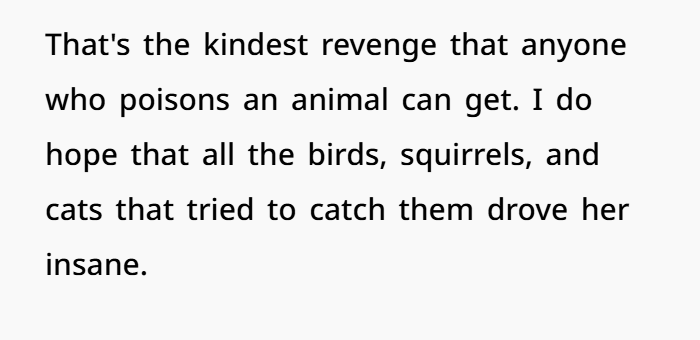
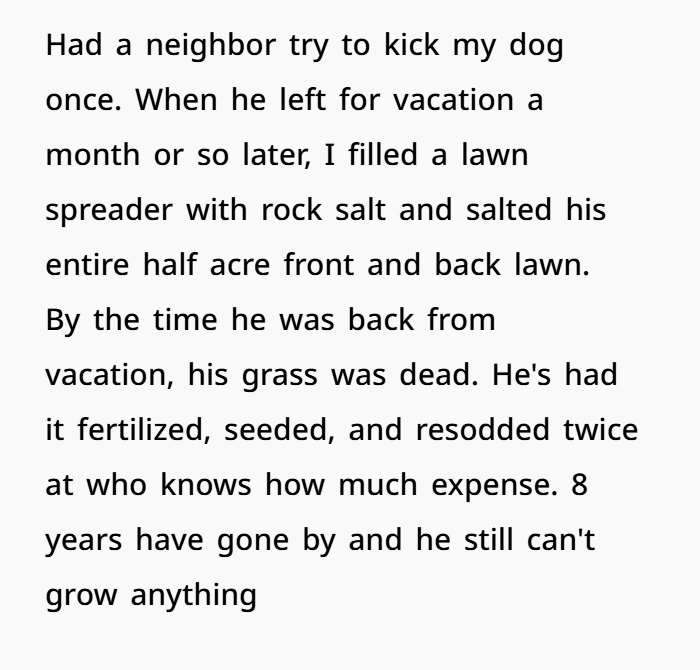




The tragic loss of your cats due to intentional poisoning is a stark reminder of the devastating effects of neighborly disputes and animal cruelty. It emphasizes the importance of vigilance in protecting pets, understanding the legal avenues available for addressing such grievances, and the potential repercussions of seeking revenge. Moving forward, fostering open communication, empathy, and utilizing legal channels can help prevent similar incidents and promote a more compassionate community environment.

